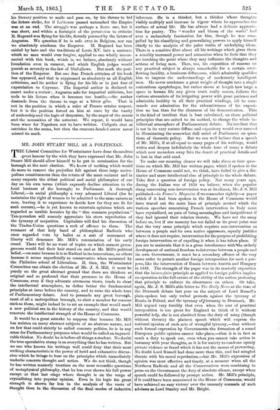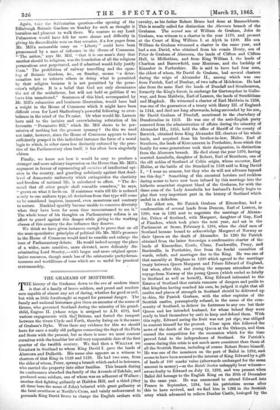MR. JOHN STUART MILL AS A POLITICIAN.
THE Liberal Committee for Westminster have done themselves great honour by the wish they have expressed that Mr. John Stuart Mill should allow himself to be put in nomination for the borough at the next election. We know of nothing which would do more to remove the prejudice felt against these large metro- politan constituencies than the return of the most eminent and in many respects the ablest political and social philosopher of our day on his own terms (which expressly decline attention to the local business of the borough) to Parliament. A thorough Liheral,—in social philosophy a very advanced Liberal (for he maintains the right of women to be admitted to the same careers as men, leaving it to experience to decide how far they are fit for such careers),—he is yet known to entertain opinions Which are regarded as terrible heresies by the "dim common populations." Ten-pounders will scarcely appreciate his stern reprobation of the tyranny of majorities. Capitalists will find his discussion of the Trades-Union questions a rock of offence to them. The remnant of that holy band of philosophical Radicals who once regarded vote by ballot as a sort of sacrament of liberty will denounce Mr. Mill's renunciation of his early creed. There will be no want of topics on which earnest green- grocers would feel their hair stand on end at Mr. Mill's political belief, —on some because it is so Radical in its innovations, on others because it seems superficially so conservative when measured by. the Philistine school of Liberalism. If, then, the Westminster Committee can obtain the election of Mr. J. S. Mill, it must be purely on the great abstract ground that there are thinkers so original and so profound that their presence in the House of Commons, even if they advocate erroneous views, tends to clear the intellectual atmosphere, to define better the fundamental principles at issue before the country, and to raise the whole tone -of Parliamentary debate. And to persuade any great borough, most of all a metropolitan borough, to elect a member for reasons such as these, might indeed be to set an example that would mark a new political era in the history of the country, and that would renovate the intellectual strength of the House of Commons.
It would be a great mistake to suppose that because Mr. Mill has written on many abstract subjects of an abstruse nature, and on few that could strictly be called concrete politics, he is in any sense for Parliamentary purposes what would be called an impracti- cable thinker. No doubt he is before all things a student. No doubt the true speculative stamp is on everything that he has written. Rat no one who knows his writings well could deny that their most striking characteristic is the power of lucid and exhaustive discus- sion which he brings to bear on the principles which immediately -underlie concrete thought and action. We do not think, though he has written masterly treatises on the most recondite questions of metaphysical philosophy, that he has ever shown-his-full power except at that last stage where thought is on -the verge of crystallizing into popular opinion. Even in his logic his great strength is shown far less in the analysis of the roots of thought than in the discussion of the final modes of inductive
inference. He is a thinker, but a thinker whose thoughts visibly multiply and increase in vigour where he approaches the surface of actual life. He has always had a delicate apprecia- tion for poetry. The "wonder and bloom of the world" bad ever a melancholy fascination for him, though he was com- pelled by his classifying and generalizing powers to apply himself
chiefly to the analysis of the paler realm of underlying ideas. There is a sensitive fibre about all his -writings which gives them
a sensibly increased power and animation when he feels that they are touching the point where they may influence the thoughts and actions of living men. Then, too, his exposition of reasons on any practical subject is always remarkable for a certain over- flowing lucidity, a luminous diffuseness, which admirably qualifies him to impress the understandings of moderately intelligent men. He never condenses a great weight of thought into a single sententious apophthegm, but rather shows at length how large a space in human life any given truth really covers, follows the various streamlete of its irrigating power with great patience and admirable lucidity in all their practical windings, till he com- mands our admiration for the exhaustiveness of his exposi- tion no less than for the clearness of his demonstration. This is the kind of intellect that is best calculated, on those political principles that are suited to its method, to change the whole in- tellectual atmosphere of Parliamentary debate. No intellect that is not in its very nature diffuse and expository would ever succeed in illuminating the somewhat dull mind of ,Parliament on ques- tions of theoretic policy. But we can well believe that a speech of Mr. Mill's, if at all equal to many pages of his writings, would widen and deepen indefinitely the whole tone of many a debate which now meanders away into the desert of practical details and is lost in that arid sand.
To make our meaning clearer we -will take three or four ques- tions on which Mr. Mill has written pages, which if spoken in the House of Commons could not, we think, have failed to give a dis- tincter and more intellectual clue of principle to the whole debate. Take first a question of foreign policy. Not many years ago, during the Italian war of 1859 we believe, when the popular slang concerning non-intervention was at its climax, Mr. J. S. Mill published—in Fraser's Magazine if we remember rightly—a paper which if it had been spoken in the House of Commons would have traced out the main lines of principle around which the various speeches concerning French intervention in Italy must have crystallized, on pain of being meaningless and insignificant if they had ignored their relation thereto. We have not the essay before us, but if our memory has not failed us its great point was that the very same principle which requires non-intervention as between a people and its own native oppressors, equally justifies where it does not require, intervention for the purpose of prohibiting foreign intervention or of expelling it when it has taken place. If you are to maintain that it is a gross interference with'the orderly development of national freedom to intervene between a people and its own Government, it must be a secondary offence of the very same order to permit another foreign interposition for such a pur- pose, like the intervention of Russia between Austria and Hungary in 1849. The strength of the paper was in its masterly exposition that the laissez-faire principle as applied to foreign politics implies co-operation to the full extent of the ability of the nation professing that principle to enforce its observance on others. Or take, again, Mr. J. S. Mill's able letter to The Daily News at the time of the Denmark debate last year on the subject of Lord Russell's plain-spoken but only verbal protests against the tyranny of Russia in Poland, and the tyranny ofiGermany in Denmark. -Mr.
Mill argued very forcibly that even when the cost of practical interposition is too great for England to think of it withont powerful help, she is not absolved from the duty of using (though
without threats) the plainest speech 'which will express the national opinion of such acts of -wrongful tyranny,—that without
such formal expression by Governments the formation of a sound European public opinion cannot take plate,—that it is in fact as much a duty to speak out, even when you cannot take action in harmony with your thoughts, as it is for society to condemn openly private violence or fraud which it has not the means of preventing.
No doubt Lord Russell had done more than this, and had mingled threats with his moral reprobation,—but Mr. Mill's expression of opinion was most effective and timely, at a moment when all the Northern Radicals and all the Conservatives were combining to press on the Governmelit the duty of absolute silence, except when
speech could be followed by prompt action. Mr. Mill's principle, if it could have been announced in the House of Commons, fwould have achieved an -easy victory over the unmanly counsels of such advisers as Lord Stanley and Mr. Bright. Again, take the Sabbatarien question—the opening of the Edinburgh Botanic Gardens on Sunday for such as thought it harmless and pleas int to walk there. We venture to say Lord Palmerston would have felt far more shame and difficulty in giving his discreditable vote on that occasion, if a few pages from Mr. Mill's memorable essay on " Liberty " could have been pronounced by a man of influence in the House of Commons. "The notion," says Mr. Mill, "that it is one man's duty that another should be religious, was the foundation of all the religious persecutions ever perpetrated, and if admitted would fully justify them." The prohibition of railway travelling and the open- ing of Botanic Gardens, &c., on Sunday, means "a deter- mination not to tolerate others in doing what is permitted by their religion because it is not permitted by the perse- cutor's religion. It is a belief that God not only abominates the act of the misbeliever, but will not hold us guiltless if we leave him unmolested." Sentences of this kind, accompanied by Mr. Mill's exhaustive and luminous illustration, would have had a weight in the House of Commons which it might have been difficult even for Lord Shaftesbury's powerful following to over- balance in the mind of the Pramier. Or what would Mr. Lawson have said to the incisive and overwhelming refutation of his favourite "Permissive Bill," which Mr. Mill shows to be per- missive of nothing but the grossest tyranny ? On this we need not insist, however, since the House of Commons appears to have sufficiently grasped in this individual instance the force of a moral logic to which, in other cases less distinctly enforced by the prac- tice of the Parliamentary class itself, it has often been singularly obtuse.
Finally, we know not how it would be easy to produce a stronger and more salutary impression on the House than Mr. Mill's argument in favour of representing all varieties of intellectual opi- nion in the country, and guarding sedulously against that dead- level of democratic uniformity which extinguishes the elasticity and freedom of national life, is calculated to effect. "The de- mand that all other people shall resemble ourselves," he says, "grows on what it feeds on. If resistance waits till life is reduced nearly to one uniform type, all deviations from that type will come to be considered impious, immoral, even monstrous and contrary to nature. Mankind speedily become unable to conceive diversity when they have been for some time unaccustomed to see it." The whole tenor of his thoughts on Parliamentary reform is an effort to guard against this danger while giving to the working classes of this country the due influence they deserve.
We think we have given instances enough to prove that on all the semi-speculative principles of political life Mr. Mill's presence in the House of Commons would tend to ennoble and enlarge the tone of Parliamentary debate. He would indeed occupy the place of a wider, more sensitive, more elevated, more delicately dis- criminating Lord Stanley,—with larger and more original specu- lative resources, though much less of the aristocratic pachyderms- tousness and worldliness of tone which are so useful for practical
statesmanship. •































 Previous page
Previous page